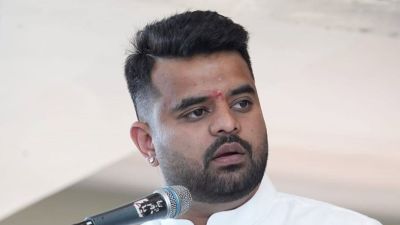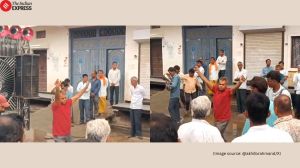Expression of views on social media vital to democracy: Ex-CJI Gogoi
In an exclusive conversation with The Indian Express, Gogoi expressed his views on action against individuals over social media posts in wake of the arrest of Vadgam MLA Jignesh Mevani by the Assam police.
 Former Chief Justice Ranjan Gogoi (File)
Former Chief Justice Ranjan Gogoi (File)Freedom of expression is a vital part of democracy, considering it does not cross the “Lakshman Rekha” of public order and morality, said former Chief Justice of India Ranjan Gogoi in Vadodara where he addressed the fifth Gujarat Chhatra Sansad on Sunday.
In an exclusive conversation with The Indian Express, Gogoi expressed his views on action against individuals over social media posts in wake of the arrest of Vadgam MLA Jignesh Mevani by the Assam police.
“I am not aware of the specific case of the Gujarat MLA but expression of views — now on social media — is a critical part of healthy democracy, so long as it does not cross the Lakshman Rekha of public order and morality, be it against an individual or an institution. If the opinion is within the line (of public order), it should not be restrained…,” said Gogoi.
Adding that such an opinion should be based on facts and bonafide information, the former CJI said, “If it is an opinion not based on facts and disturbs public order and transgresses morality or creates distrust among the public for the institution, posing a threat to national interest, action needs to be taken. Nothing can be bigger than national interest.”
Gogoi also said that the present generation youth in the country are fortunate to have the power of social media. “It is a powerful tool, but it can be misused, which is unfortunate… Youth today, who wish to enter public life or politics must be aware that they cannot be successful unless they work hard and base their journey on facts. This is because it is very easy for misinformation to be spread…”
Dwelling on activism arising out of delayed that justice system, Gogoi said, “Delay in the justice system makes 50 per cent of the consumers of the court happy… case, it is the litigant, who seeks quick disposal. So that is only 50 per cent of the customers… But on a serious note, pendency of cases is not a difficult problem. It needs a dedicated approach to segregate cases that are important and alive from those that are small causes…”
Stating that the approach worked in the Guahati High Court, Gogoi said, “During the pre-Covid times, we had about three crore pending cases in courts… post-Covid19 it is about five crore… A majority of this number will be cases of traffic penalties… So, there is a need to identify the actually important cases, which would be only a few lakhs…”
The former CJI added that although India has 26,000 judges, increasing the number of judges would still not resolve the issue of pendency.
In an interactive session at the Chhatra Sansad, Gogoi spoke about addressing an unusual press conference in January 2018 along with Justice J Chelameshwar, Justice Kurian Joseph and Justice Madan Lokur at the residence of Chelameswar in New Delhi to air their grievances over the then chief justice Dipak Misra’s style of functioning.
Replying to a query, Gogoi said, “It was a very unusual event. Judges normally do not meet the press formally. I hope that the press conference we hosted in January 2018 would be the last… There were a lot of institutional issues that needed to be addressed. We decided that the country must know what it was. I do not expect such an event in the future…”
To a question on managing “emotions” during the historic Ram Janmabhoomi judgement delivered in 2019, Gogoi said, “Emotions do not come in way of judgements because of years of training and discipline. I became a judge in 2001 and the judgement of Ram Janmabhoomi came on the eve of my retirement in 2019. Nineteen years is long enough to be professional…”
Gogoi, however, refused to answer questions over NRC citing “conflict of interest” but agreed to a comment that the people of northeastern states suffered. “I left my home state of Assam in 2010 to go to Punjab and returned to my home state in 2019… There is a feeling (of discrimination) that must be dispelled by making the growth inclusive,” he said.












